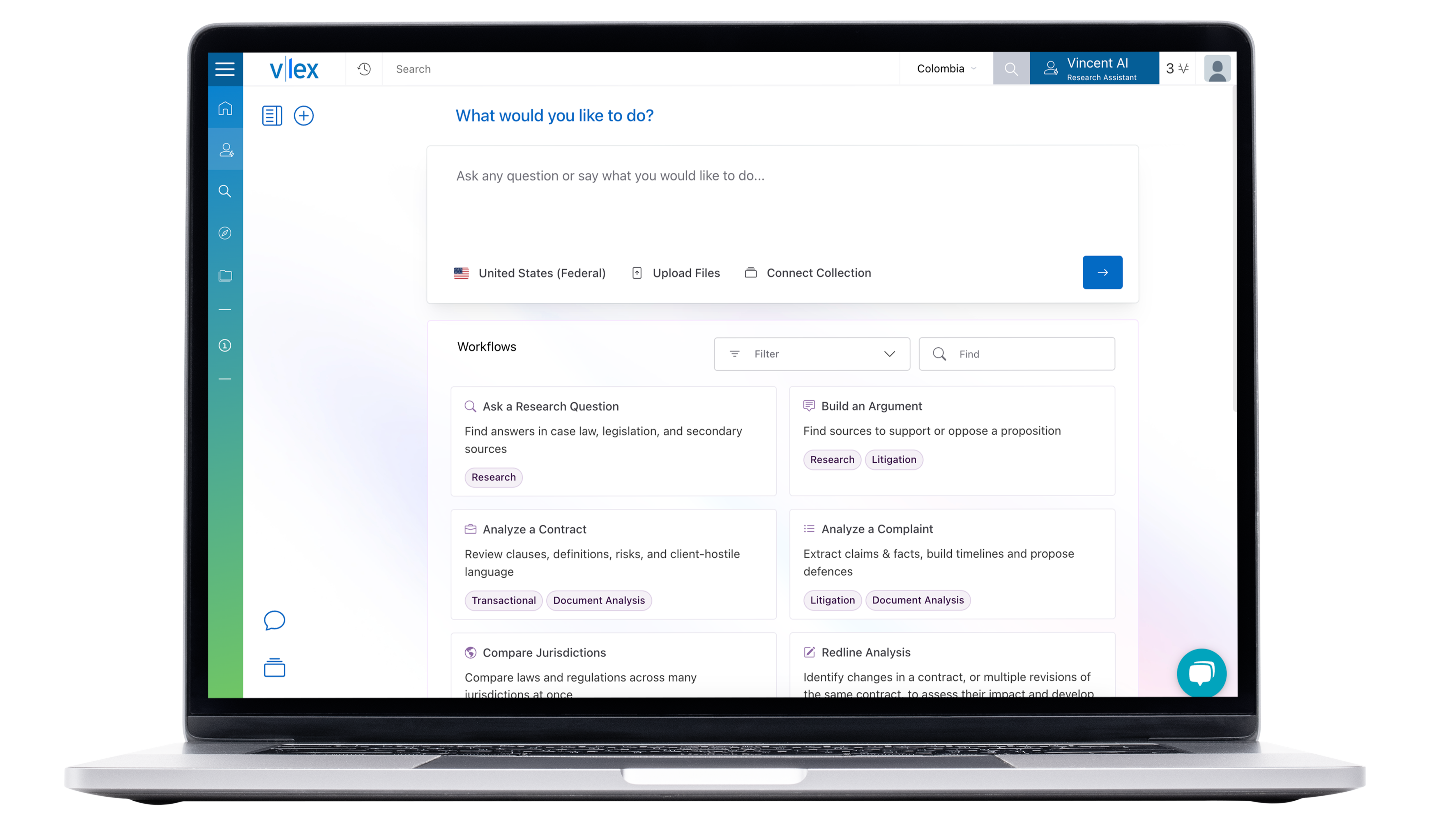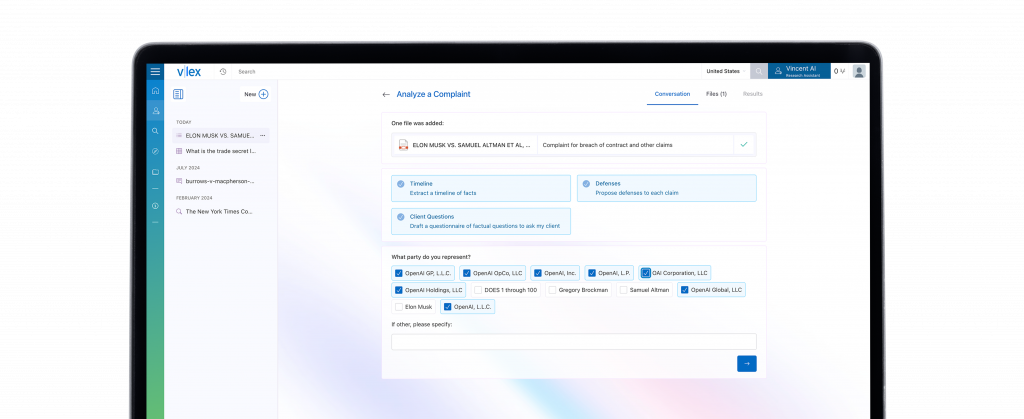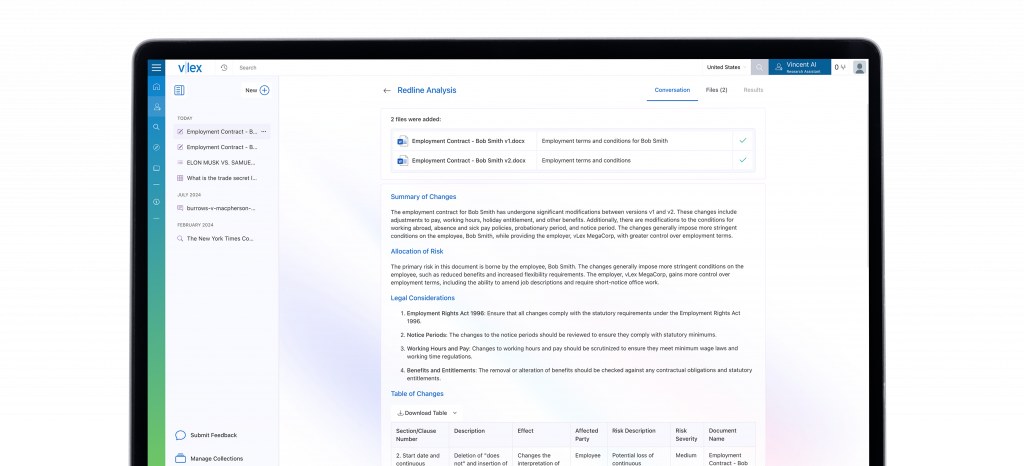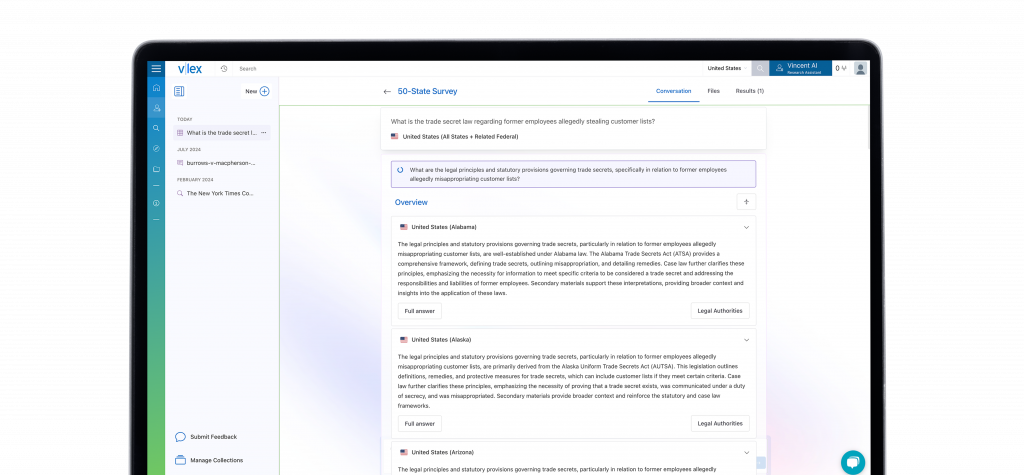Ever since Casetext released CoCounsel on March 1, 2023, the race has been on among legal tech companies to develop the most capable generative AI assistant for legal professionals. Today, vLex is releasing a major upgrade to its Vincent AI that puts it firmly in the running for that honor.
I might be even more effusive had I actually been able to try it before writing this, but at this point, I am basing my judgement on materials provided by vLex and on a demonstration I was given earlier this week by Ed Walters, chief strategy officer at vLex. What I have seen is impressive.
Rather than call it an AI legal assistant, vLex calls the enhanced Vincent AI an AI workflow assistant. That is an apt description, as its capabilities are not meant to replace the work of lawyers and legal professionals, but rather to speed and enhance their workflows.
Among the highlights of today’s release:
- Vincent AI goes from four AI-assisted workflows to 12.
- It expands its capabilities from having primarily a litigation focus to also addressing transactional workflows.
- It expands the numbers of countries it covers by three, adding France, Portugal and Brazil.
- It adds new features to make it easier to engage with the AI, such as a prompt assistant and multi-turn conversations.
- It adds new features for working with collections of documents.
- It adds deeper integration with federal and state court dockets through Docket Alarm.
All of this is made even more notable given that, even before today’s upgrade, Vincent AI had just recently been named the 2024 New Product of the Year by the American Association of Law Libraries, the first generative AI tool to be so recognized by the AAII.
New AI-Assisted Workflows
The most notable aspect of today’s release is the expansion of Vincent’s AI-driven workflows to 12. Vincent now can be used to:
- Analyze a contract. Identify non-market provisions, harmonize definitions, spot risks, create closing checklists, catalog post-closing obligations, and flag client-hostile language
- Explore a collection. Extract key facts, create timelines, and analyze entire folders of litigation or transactional documents, including from firm DMS systems
- Ask a research question. Create a research memo to answer legal questions in 13 countries, with direct citations and links to verified sources, including Fastcase’s Cert citator in the United States
- Analyze a deposition. Summarize, extract key facts, identify follow-up questions and objections, and build timelines
- Build an argument. Research and draft winning arguments for or against propositions, based on precedent in specific jurisdictions
- Compare law in different jurisdictions. Scan the horizon, or compare governing law across different states in the United States, or between different countries
- Conduct a 50-State survey of law. For U.S. work, compare the law of all 50 states and the federal government with a single, plain-language search, and get table results, with editorial support, in minutes
- Find related authorities. Upload a document to find related authorities from vLex, including primary and secondary materials
- Analyze a complaint. Extract claims, facts, and timelines, create questionnaires, itemize available defenses
- Analyze and review redlines. Review redlines to summarize changes, assess their likely impact, and develop a negotiation strategy
- Compare documents. Upload multiple documents to identify differences in table format
And this list is not the end of the story. vLex says it will be continuing to add new workflows in future releases.
New Countries Added to the Platform
Vincent AI already could be used to index and analyze the law of the United States, United Kingdom, Ireland, Spain, the European Union, Mexico, Chile, Colombia, New Zealand and Singapore.
With this release, Vincent has added native legal workflows in French and Portuguese, with the addition of the law of France, Portugal, and Brazil.
New Abilities Beyond Workflows
In addition to new skills and countries, this release brings new features to help users maximize their use of the AI and engage with their own collections of documents. The new features include:
- Multi-turn conversations, enabling users to conduct deeper analysis or ask follow-up questions, similar to a conversation with a research assistant.
- Prompt Assist, which automatically offers suggestions about which workflow tools to use, or how to phrase prompts for maximum effectiveness.
- Collections, which enable users to work not just on single documents, but on multi-document libraries that they create. vLex says these could include playbooks, in-house KM resources, brief banks, and style guides. They can be made available to a single user, or to entire teams.
This Collections feature supports both Retrieval-Augmented Generation (RAG) tasks, such as asking questions to synthesize knowledge about the entire collection, and batch processing workflows such as document extraction.
Vincent AI in Docket Alarm
vLex says that this release brings the first deep integrations of Vincent AI into the Docket Alarm collection of state and federal dockets, including the complaints, answers, briefs and pleadings included within those dockets.
The integration uses new APIs that Docket Alarm developed this summer to provide law firms and others with access to docket data at scale. With this release, Vincent AI can access those APIs to search Docket Alarm using AI similar to the way Vincent AI searches legal sources from vLex.
The new integration, called Vincent in Docket Alarm (or “VIDA”), allows users to get deeper insights into the data included in the more than 820 million documents in Docket Alarm, vLex says.
“The Autumn ‘24 release includes lots of new workflow tools, but this new version of Vincent AI goes way beyond just new skills,” Robin Chesterman, vLex global head of product, said in a statement provided by the company. “Vincent AI is now a platform.”
And I would add that vLex is no longer just a legal research service, as I have always referred to it. As a matter of fact, vLex now describes itself as a “legal intelligence company,” and that strikes me as much more apt.
 Robert Ambrogi Blog
Robert Ambrogi Blog


